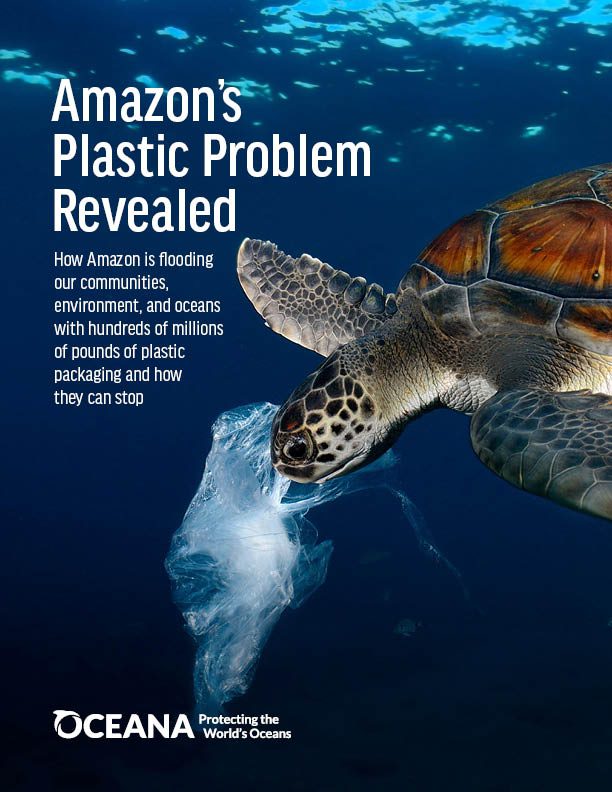Report | December, 2020
Amazon’s Plastic Problem Revealed
Oceana analyzed e-commerce packaging data and found that Amazon generated 465 million pounds of plastic packaging waste in 2019. This includes air pillows, bubble wrap, and other plastic packaging items added to the approximately 7 billion Amazon packages delivered in 2019. The report also found that Amazon’s estimated plastic packaging waste, in the form of air pillows alone, would circle the Earth more than 500 times.
By combining the e-commerce packaging data with findings from a recent study published in Science, Oceana estimates that up to 22.44 million pounds of Amazon’s plastic packaging waste entered and polluted the world’s freshwater and marine ecosystems in 2019, the equivalent of dumping a delivery van payload of plastic into the oceans every 70 minutes.
Plastic is a major source of pollution and is devastating the world’s oceans. Sea turtles and other ocean animals mistake the kind of plastic used by Amazon as food, which can ultimately prove fatal. Oceana surveyed more than 5,000 Amazon customers in the U.S., Canada, and the UK in 2020 and found that a vast majority were concerned about plastic pollution and its impact on the ocean. Customers want Amazon and other major online retailers to offer plastic-free packing choices at checkout. More than 660,000 customers and others have signed a petition calling on the company to offer plastic-free choices at Change.org/Plastic Free Choice.
The report discloses that the type of plastic often used in packaging by Amazon, referred to as plastic film, is effectively not recycled, despite the company’s claims of recyclability. And, unlike other companies, Amazon appears to be prioritizing the increased use of “flexible packaging” made of plastic. The company has stated it uses flexible packaging to help protect the climate and environment but has not publicly disclosed the data underlying this claim.
Amazon’s plastic waste and pollution footprint is expected to drastically increase, given analysts’ recent estimates that Amazon’s sales will increase by more than a third in 2020. The rapidly growing plastic pollution crisis needs to be solved by major plastic polluters like Amazon taking steps to reduce plastics. The report calls on Amazon to reduce its plastic footprint by offering plastic-free packaging as an option at checkout, consistently reporting on its plastic footprint, and eliminating plastic packaging.
- Press Release (USA)
- Press Release (UK)
- Press Release (Canada)
- Press Release (Spain)
- Press Release (Germany)
- Video
- Media Assets
- Amazon’s Response
Media contacts:
Gillian Spolarich | gspolarich@oceana.org | 202-467-1909
Alex Gray | agray@oceana.org | 202-467-1914




